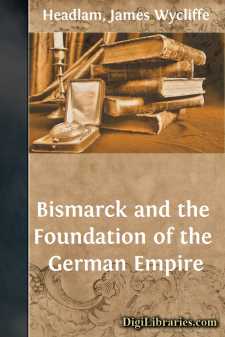Categories
- Antiques & Collectibles 13
- Architecture 36
- Art 48
- Bibles 22
- Biography & Autobiography 813
- Body, Mind & Spirit 142
- Business & Economics 28
- Children's Books 17
- Children's Fiction 14
- Computers 4
- Cooking 94
- Crafts & Hobbies 4
- Drama 346
- Education 46
- Family & Relationships 57
- Fiction 11829
- Games 19
- Gardening 17
- Health & Fitness 34
- History 1377
- House & Home 1
- Humor 147
- Juvenile Fiction 1873
- Juvenile Nonfiction 202
- Language Arts & Disciplines 88
- Law 16
- Literary Collections 686
- Literary Criticism 179
- Mathematics 13
- Medical 41
- Music 40
- Nature 179
- Non-Classifiable 1768
- Performing Arts 7
- Periodicals 1453
- Philosophy 64
- Photography 2
- Poetry 896
- Political Science 203
- Psychology 42
- Reference 154
- Religion 513
- Science 126
- Self-Help 84
- Social Science 81
- Sports & Recreation 34
- Study Aids 3
- Technology & Engineering 59
- Transportation 23
- Travel 463
- True Crime 29
Bismarck and the Foundation of the German Empire
Description:
Excerpt
CHAPTER I.
BIRTH AND PARENTAGE.Otto Eduard Leopold Von Bismarck was born at the manor-house of Schoenhausen, in the Mark of Brandenburg, on April 1, 1815. Just a month before, Napoleon had escaped from Elba; and, as the child lay in his cradle, the peasants of the village, who but half a year ago had returned from the great campaign in France, were once more called to arms. A few months passed by; again the King of Prussia returned at the head of his army; in the village churches the medals won at Waterloo were hung up by those of Grossbehren and Leipzig. One more victory had been added to the Prussian flags, and then a profound peace fell upon Europe; fifty years were to go by before a Prussian army again marched out to meet a foreign foe.
The name and family of Bismarck were among the oldest in the land. Many of the great Prussian statesmen have come from other countries: Stein was from Nassau, and Hardenberg was a subject of the Elector of Hanover; even Blücher and Schwerin were Mecklenburgers, and the Moltkes belong to Holstein. The Bismarcks are pure Brandenburgers; they belong to the old Mark, the district ruled over by the first Margraves who were sent by the Emperor to keep order on the northern frontier; they were there two hundred years before the first Hohenzollern came to the north.
The first of the name of whom we hear was Herbort von Bismarck, who, in 1270, was Master of the Guild of the Clothiers in the city of Stendal. The town had been founded about one hundred years before by Albert the Bear, and men had come in from the country around to enjoy the privileges and security of city life. Doubtless Herbort or his father had come from Bismarck, a village about twenty miles to the west, which takes its name either from the little stream, the Biese, which runs near it, or from the bishop in whose domain it lay. He was probably the first to bear the name, which would have no meaning so long as he remained in his native place, for the von was still a mark of origin and had not yet become the sign of nobility. Other emigrants from Bismarck seem also to have assumed it; in the neighbouring town of Prenzlau the name occurs, and it is still found among the peasants of the Mark; as the Wends were driven back and the German invasion spread, more adventurous colonists migrated beyond the Oder and founded a new Bismarck in Pomerania.
Of the lineage of Herbort we know nothing; his ancestors must have been among the colonists who had been planted by the Emperors on the northern frontier to occupy the land conquered from the heathen. He seems himself to have been a man of substance and position; he already used the arms, the double trefoil, which are still borne by all the branches of his family. His descendants are often mentioned in the records of the Guild; his son or grandson, Rudolph or Rule, represented the town in a conflict with the neighbouring Dukes of Brunswick. It was his son Nicolas, or Claus as he is generally called, who founded the fortunes of the family; he attached himself closely to the cause of the Margrave, whom he supported in his troubles with the Duke of Brunswick, and whose interests he represented in the Town Council....


